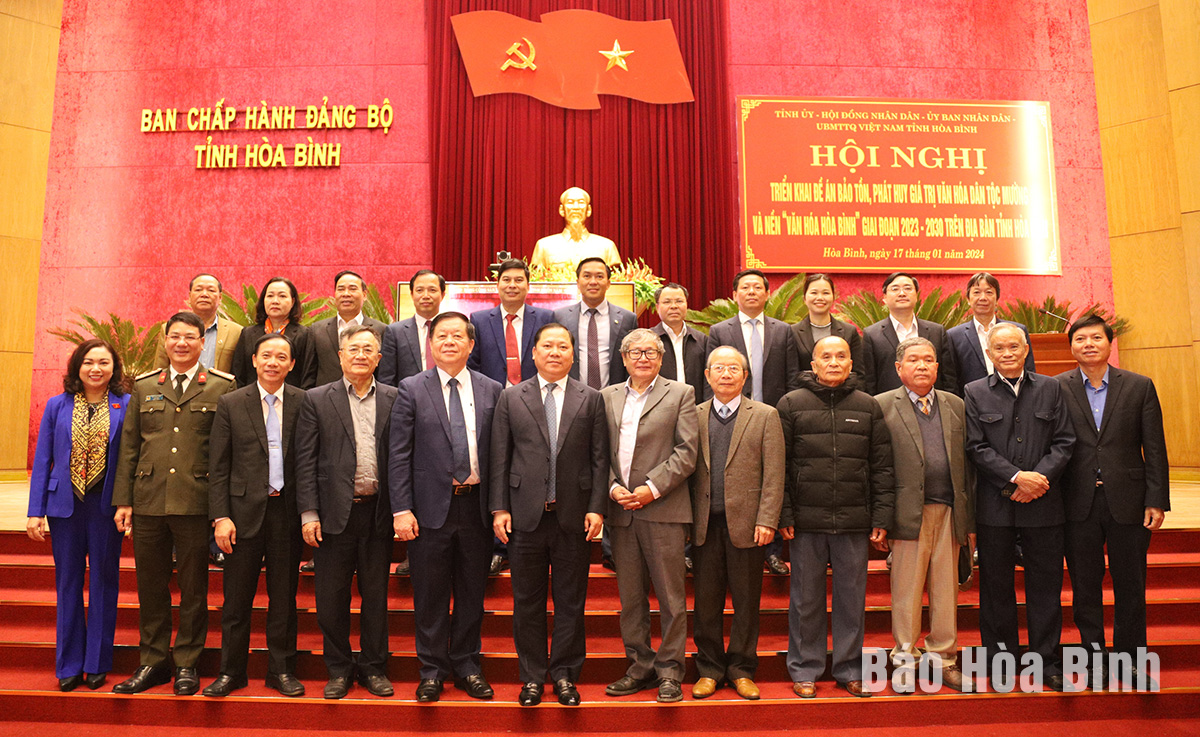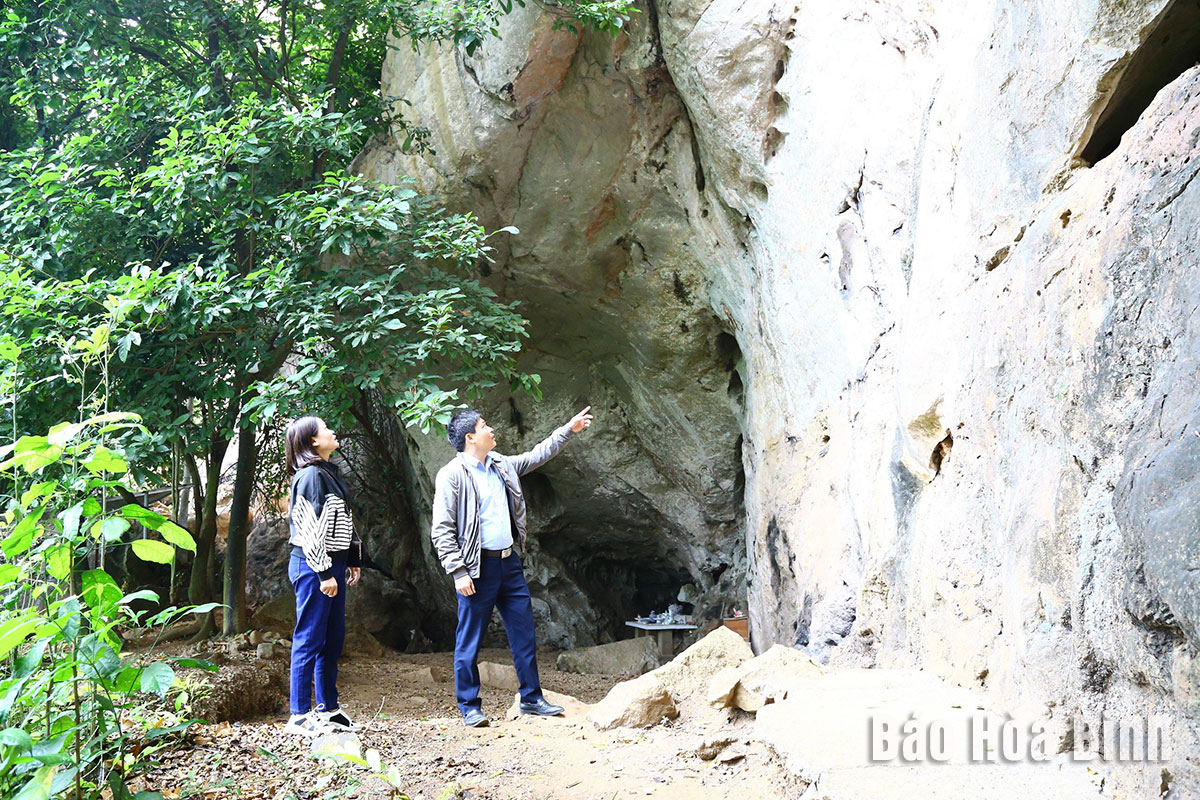
The project on preserving and promoting cultural values of the Muong ethnic group and the Hoa Binh civilisation for 2023-2030 in Hoa Binh province has been approved, helping promote and popularise the region and the people of Hoa Binh while developing unique tourism products to attract domestic and international tourists, contributing to the province's socio-economic development in the near future.

Nguyen Trong Nghia, Secretary of the Party Central Committee, head of the Party Central Committee's Communications and Education Commission, and other leaders and delegates attending the conference to deploy the project on preserving and promoting the cultural values of the Muong ethnic group and the "Hoa Binh civilisation” in the 2023 - 2030 period in Hoa Binh province.

Officials of the People's Committee of Yen Phu commune (Lac Son) visit the Lang Vanh Stone Roof relic - a place with many relics of "Hoa Binh civilisation".
The Muong ethnic people make up more than 63% of Hoa Binh’s
population. Over the years, the province has placed a special emphasis on
preserving and promoting the cultural values of the group’s unique cultural
values.
The Khai ha festival of the Muong ethnic group in Hoa Binh, the
biggest and oldest traditional folk event indispensable to the community on the
occasion of the lunar new year, was held in early 2023, marking a highlight in
the province's cultural events this year. In 2022, the festival was recognised
as a national intangible cultural heritage by the Ministry of Culture, Sports,
and Tourism.
Regarding intangible cultural heritage, numerous Muong cultural
relics have been discovered within the province, such asthe ancient tomb
clusters in Dong Thech, Kim Truy (Kim Boi), Lo hamlet (now Muong Lo hamlet),
Luy hamlet (now Luy Ai hamlet), and Dong Bay (Tan Lac).
The value of the Muong ethnic traditional stilt houses and
clothing has also garnered increasing attention in recent times. Muong gong
art, featured prominently in the province's festivals, has been extensively
invested in and expanded. In 2016, the art was included in the list of national
intangible cultural heritage.
Additionally, the inventory of intangible cultural heritage for
the purposes of preservation and promotion has been a focus. As a result, 267
Muong heritages of this kind have been documented.
Muong ethnic cultural values are invaluable assets that unite
the Vietnamese ethnic community. The Muong people in Hoa Binh province have
created unique cultural values from customs, practices, beliefs, cuisine, folk
songs, proverbs, festivals, folk knowledge and Mo Muong (a type of folk rite
practiced at funerals or rituals). Meanwhile, the "Hoa Binh civilisation” had
an important position during the Stone Age in Vietnam, as well as the world. It
is also an extremely valuable asset to humanity.
Outstanding artisan, cultural researcher Bui Huy Vong in Huong Nhuong commune,
Lac Son district, said that over the past time, attention has been paid to the
preservation and promotion of the values of the Muong cultural heritage. Many
typical intangible cultural heritages of the Muong ethnic group have been
recognised as national heritages such as Mo Muong Hoa Binh, Muong gong art, and
Khai ha festival.
Nhuong emphsised that the most common typical values of the
Muong national cultural heritage are to uphold the spirit of patriotism, love,
solidarity, national unity, and cohesion of clans and communities, and family
values, among others.
To preserve and promote the cultural values of the Muong ethnic group and the
"Hoa Binh civilisation", provincial authorities have supported
artisans to participate in the work and encouraged scientists to study them.
Nguyen Van Viet, Director of the Centre for Prehistory of
Southeast Asia, stressed the meaning of human heritage of the Hoa Binh
civilisation. The province has affirmed its role as the host by hosting many
conferences and organising reconnaissance, excavation and scientific
seminars.
Especially, in 2017, Hoa Binh successfully hosted the
celebration of the 85th anniversary of the world recognition of the "Hoa
Binh civilisation" and the 90th anniversary of the province’s
establishment in 2022. The province needs to promote cultural values associated
with tourism development, bringing income to people and contributing to the
budget.
According to experts, the province needs to focus on restoring typical
traditional festivals and folk games in association with developing unique and
attractive tourism products as well as promoting unique traditional festivals,
traditional costumes, houses on stilts, folk songs, Muong gongs, Mo Muong, and
beautiful customs of the Muong ethnic group in Hoa Binh. Muong people’s
language has been taught at several schools in the province.
The concerted solutions are expected to have practical effects
in exploiting the value of the Muong ethnic cultural heritage and the "Hoa
Binh civilisation". They will contribute to arousing pride and becoming a
driving force for the socio-economic development of Hoa Binh province in the
near future, gradually transforming the economic structure, labour structure,
and occupations in rural areas, increasing income, reducing poverty sustainably
for people, especially the Muong ethnic people in highland and remote areas and
creating valuable cultural products, and serving sustainable tourism
development.
Phong Phu commune, Tan Lac district of Hoa Binh province, is widely regarded as the cultural heartland of the Muong ethnic group. Among its many traditional communities, Luy Ai hamlet (formerly Ai hamlet) stands out as a rare location where the customs and way of life of the Muong Bi people remain largely intact.
The Truong Kha temple festival, a distinctive cultural event held every three years in Vu Ban township, Lac Son district, returned recently with vibrant rituals and folk traditions of the Muong people. Located next to the Buoi River in the Muong Trao fields, the Truong Kha Temple is dedicated to the three Kun Dol deities, revered for teaching farming techniques, irrigation, weaving, and protecting the harvest.
The demand for spaces serving community activities of residents in various areas across Hoa Binh city has been satisfied as local cultural houses now feature modern, spacious facilities thanks to the effective implementation of Resolution No. 49/NQ-HDND issued on December 28, 2021 by the city People's Council, which approved the plan for reorganising, converting, and allocating land for the construction, repair, and expansion of cultural houses in Hoa Binh’s villages and residential areas until 2025.
At the end of May, the Hoa Binh Provincial Ethnic Arts Troupe organized a series of performances for residents in Region 2 and Region 3 communes across the province. Bringing art to ethnic communities in remote, isolated, and especially disadvantaged areas has become a meaningful activity. These are not merely artistic performances but also journeys to disseminate cultural values, enrich spiritual life, and contribute to preserving the cultural identity of ethnic minorities.




